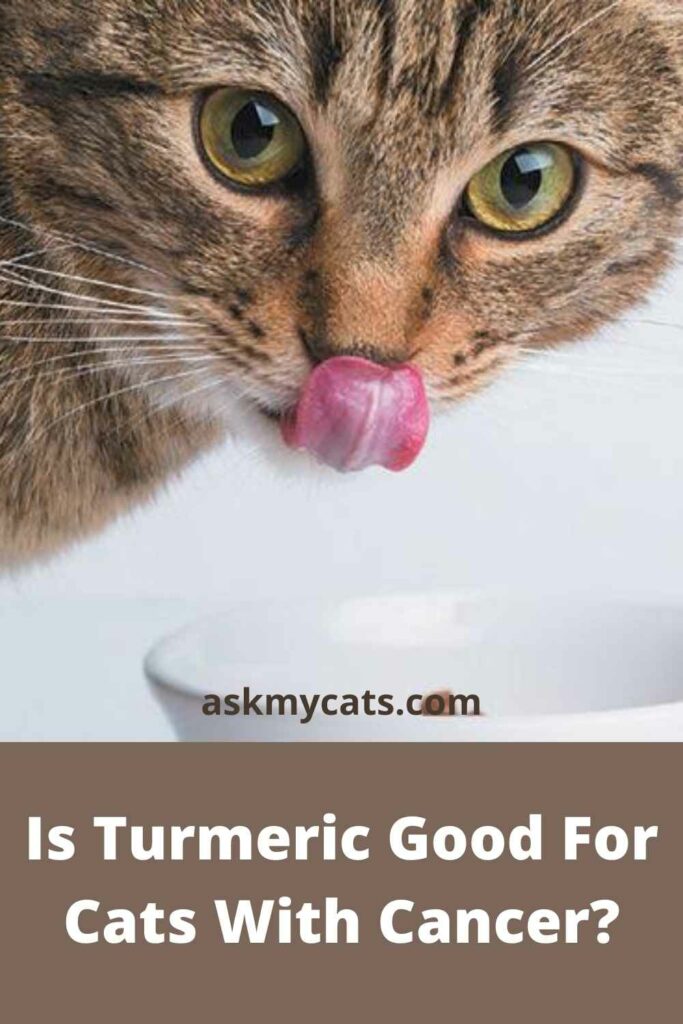Turmeric (Curcuma Longa) is a member of the ginger family. For thousands of years, the plant’s rhizomes, or spreading roots, have been utilized as a spice, perfume, cosmetic, and dye in areas of Asia. For countless years, it’s also been frequently used in Ayurveda and Chinese traditional medicine.
Yes, turmeric is safe for cats, if used occasionally. Turmeric is an antibacterial, antifungal, and antiviral spice with several therapeutic qualities, but it is best recognized for its anti-inflammatory and antioxidant characteristics.
If you want to know more about turmeric and its use on your feline companion, keep reading.


Give Your Cat the Perfect Day
Get the Free Ebook!
Can Cats Have Turmeric?
Turmeric, like ginger, is an antibacterial, antifungal, and antiviral spice with several therapeutic qualities. It is well recognized for its anti-inflammatory and antioxidant characteristics. It has a long history of usage, including making a paste to treat wounds and using it in cuisine.
Yes, cats are allowed to eat turmeric. It’s simpler to use with your pets when it’s sold as a powdered powder, but be wary of the quality of the turmeric you’re buying and using.
You will want to utilize a pure medical turmeric powder that hasn’t been combined with anything else and is in powdered form, not in tablet form or anything like that. Try to stay away from store turmeric, since it’s usually just good for cooking.
If you want your pet to benefit from the therapeutic benefits of turmeric, choose the highest grade powder available.
Is Turmeric Good For Cats?
Turmeric is beneficial to cats. Turmeric is known for its ability to aid in the treatment of diabetes, to assist the liver cope with toxins, to guard against malignancies such as pancreatic and prostate cancer, and to promote immunological health. It can assist with digestion and irritable bowel syndrome by reducing inflammation in the stomach.
Turmeric has also been related to improved heart disease by lowering inflammation of the thin layer of tissue that lines organs, as well as improved brain function by maintaining the number of growth hormones involved with neurons multiplying and growing in the brain.

Turmeric, like ginger, has two major advantages:
- It’s capacity to function as a digestive aid, which aids in the maintenance of healthy digestive enzymes in the intestines.
- It’s capacity to function as a natural anti-inflammatory agent. Prolonged inflammation is well established in science to be the basis of chronic illnesses.
It has been reported to aid in the treatment of the following illnesses too:
- Arthritis, or joint discomfort
- Works as a natural pain reliever
- Heart disease assistance
- Mental well-being
- As a cancer preventative as well as a cancer treatment
- Shrinks the size of tumor
- Assistance with IBS problems
- Helps elevate allergies
- Immune system booster
- Aids in the treatment of autoimmune disorders
- Can aid in the prevention of worms
- Diarrhea treatment
- Aids in preventing the accumulation of toxins in the liver and pancreas.
Is Turmeric Plant Poisonous To Cats?
Curcumin Longa, also known as the turmeric plant and is poisonous to cats. Some preparations of this plant may induce vomiting in cats, therefore it’s better to stay away from them.
They’re a common ingredient in both pet and human supplements. Therefore, keep your cat away from the turmeric plant as it can be detrimental to their health.
How Do I Give Turmeric To My Cat?

Turmeric’s therapeutic qualities must be coupled with good quality oil and black pepper in order for them to be accessible to your pet’s body. These components work together to generate the ideal natural chemical reaction.
It releases the curcumin in turmeric and allows it to readily traverse the cells within the body.
When given alone, turmeric may pass through the digestive system far too rapidly to be effective.
We recommend making a paste and giving it to your feline friend. Follow the instructions to ensure that your cat receives the appropriate dosage.
Ingredients:
- 1/2 cup (60g) of Turmeric powder
- 1 cup (250 mL) water + additional water in case it’s needed
- A third cup (70 ml) oil made from coconut. Use raw, unrefined, cold-pressed oil.
- Alternatively, you may use olive oil.
- 2 – 3 teaspoons freshly ground black pepper
- Use freshly ground black peppercorns that you can grind right before serving, else the natural chemical interaction between the oil, turmeric, and pepper may fail.
Directions:
- Bring the water and turmeric to a boil in a saucepan, then reduce the heat to low and allow the mixture to simmer until it forms a thick paste. This should take no more than ten minutes.
- If you’re using raw turmeric, grate it beforehand and simmer it for at least 30 minutes. You want this to form a paste, similar to hummus, so you may need to add a bit more water to obtain the right consistency.
- If you’re replacing, add the freshly ground black pepper and organic coconut or virgin cold-pressed olive oil when the paste is no longer hot but still warm.
- Mix everything together to ensure that the oil and pepper penetrate the paste completely.
- You may freeze the paste in ice cube trays, or put it in a glass jar and keep it in the fridge for 7 to 10 days.
We’ve noticed that cooking a little bit of liver separately and then grating this cooked liver into the mix once both the liver and paste are cool makes it very appealing to finicky cats or dogs.
If you need to add a little more water, you can use a smidgeon of the water from the cooked liver to replace any more water needed to form the paste.
Feeding Guide:
- Start small and keep it simple. Obviously, the smaller the pet, the less they’ll require, and the feeding guidance will vary depending on the illness you’re treating, but work with your veterinarian to get the doses appropriate for their health.
- Mixing the paste into your pet’s food is the easiest method to administer to them. If you’ve included the liver for your picky pet, you can treat it like a small treat up to the suggested quantity.
- When adding this to your pet’s meal for the first time, half the suggested quantity and gradually increase to the daily amount.
Turmeric is pet-friendly, so there shouldn’t be any problems, but just in case, keep a watch out for any unusual symptoms in your pet, such as vomiting or constipation, when you first start.
How Much Turmeric Should I Give My Cat?
It is suggested that you mix a tiny quantity of turmeric into your pet’s food and then add some kefir or water. Because the flavor is moderate, most animals don’t mind eating it.
You should begin with 1/4 teaspoon per day for your cat, while bigger cats should begin with 1 teaspoon per day. Over the next several days, monitor their response and adjust your dosage as needed.
However, no matter how big your cat is, you should never give more than 1 tablespoon each day since too much might have negative consequences.
How Do I Make Turmeric Paste For My Cat?
Turmeric paste may be purchased ready-made. This is a lot more useful for pet owners who don’t have a lot of time to prepare the dish themselves.
If you’d rather make your own, follow the instructions below:
- In a pan, combine 1/2 cup organic turmeric powder with 1 cup water.
- Stir the mixture for about 10 minutes over low-medium heat, until it becomes a thick paste.
- Once the mixture has reached the desired consistency, whisk in 1/4 cup organic cold-pressed coconut oil (or olive oil) and 1/2 teaspoons freshly crushed black pepper.
- Allow the mixture to cool before transferring it to a glass jar with a lid and storing it in the refrigerator. Within two weeks, the paste should be utilized.
Turmeric paste is well-known for its wonderful advantages in cats. However, if the animal consuming it is on medicine, is undergoing radiation therapy, or is pregnant, caution should be exercised. Always consult your doctor or veterinarian before using the paste if any of these conditions apply to you or your pet.
Is Turmeric Powder Good For Cat Wounds?
Turmeric is also a very effective antibacterial for pets. You may use it for cat wounds.
After washing the wounds with water and peroxide, you can apply turmeric straight to them. This is the most effective natural medication.
Is Turmeric Good For Cats With Kidney Disease?
Curcumin, the primary component in turmeric (Curcuma Longa), a traditional herbal medicine and culinary spice, has anti-inflammatory effects. Chronic kidney disease (CKD) is an inflammatory condition that can progress to end-stage renal failure, necessitating dialysis or transplantation.
It is also commonly linked to other inflammatory diseases including diabetes and cardiovascular problems. Using turmeric may help elevate such kidney diseases in cats.
Is Turmeric Safe For Cats Fur?
The advantages of turmeric for cats are currently being studied. Before using turmeric as a medicinal solution on your own, we recommend speaking with your veterinarian about safe and effective therapies for your pet.
We advise against using turmeric powder on cats, not so much for safety concerns as for the possibility of coloring the feline’s hair. It might take months for the effects to wear off.
You should use one of the commercially available extract forms instead of the powder if they wish to utilize it topically.
Is Turmeric Good For Cats With Cancer?

By releasing white blood cells into bodily tissues, turmeric has been found to decrease low-grade, acute inflammation. Chronic inflammation can lead to cancers like Gastrointestinal Lymphoma.
Turmeric’s anti-inflammatory properties suggest that it may be able to prevent precancerous alterations from progressing to cancer. Therefore, it is good for treating cancer in cats.
It has been proven in studies to inhibit the development of new cancer cells. Curcumin has been found to reduce tumor growth and decrease cancer cells by shutting off tumor-feeding blood channels.
Because cats have a different liver than dogs or people, several medicines that aren’t poisonous to dogs or humans may be toxic to cats. In this scenario, the therapeutic effects of curcumin against cancer are turned off by dog and human liver enzymes, but because feline livers work differently, the advantages may not be totally lost.
Curcumin is proven to be an effective cancer therapy in cats, both as a preventive measure and as active treatment.
Frequently Asked Questions
Is Turmeric Safe For Cats?
Yes, turmeric is safe for cats in small quantities. It acts as natural medicine.
How Much Turmeric Should I Give My Cat?
Start with 1/4 teaspoon per day for cats and, and increase gradually. However, make sure to not give more than 1 teaspoon each day.
Can I Give My Cat Turmeric Powder?
Turmeric powder is safe to feed to your cat. It’s good for your cat’s health. Due to its antioxidant qualities, turmeric can be used to help your cat fight cancer.
Final Words
Turmeric’s anti-inflammatory qualities make it useful for arthritic disorders and possibly anti-cancer assistance in cats. Turmeric’s therapeutic qualities may also help cats with autoimmune illnesses, liver problems (via increasing liver detoxification), and heart and circulation support.
Turmeric reduces the risk of blood clotting and lowers the bad cholesterol that cats might have. However, there are no safety or toxicity studies in cats, and the possible advantages in cats are largely anecdotal.
As with anything, especially untested herbs, it’s preferable to utilize turmeric under the care of a veterinarian.
Feel free to drop your queries regarding your feline friend in the comment section below.

I’m a bit confused if turmeric works as an Anti-inflammatory spice why does it elevate kidney disease in cats?
Hello Kaitlyn,
Actually turmeric has oxalates which can increase the risk of kidney stones. So excessive intact of turmeric should be avoided.
Keep in mind that occasionally in normal quantity, turmeric is totally safe for cats.
Happy cat parenting.
I use Advanced Turmeric with Curcumin Meriva 500mg by Webber Naturals for myself and wonder if giving my old arthritic cat that doesn’t have kidney disease some if it would work better than the food grade turmeric as it is formulated for high absorption.
For cats, turmeric is a reliable anti-inflammatory mainstay. It eases their indigestion, arthritis pain, and other symptoms.
You can speak with your veterinarian about whether it is okay to use human-specific products for cats.
my cat sophie has cancer of the ear. if i use turmeric, how soon could i see if it is working. she is 12 years old. i’m hoping i wont have to send her to the rainbow bridge. thanks for your help.
Hello Doug,
sorry to hear about Sophie.
It’s hard to predict the exact timeline but I would highly suggest you to consult your vet.